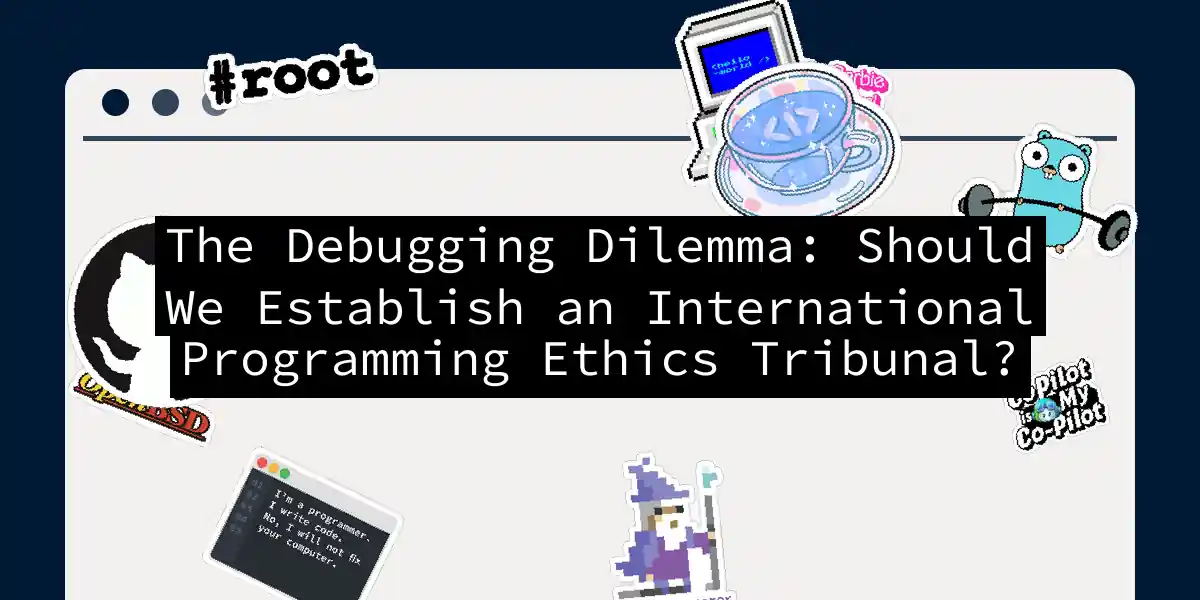The Coder’s Conscience Conundrum
Picture this: You’re debugging a critical system at 2 AM when you discover a backdoor that could access millions of user photos. Your CEO wants it deployed yesterday. What’s your next move? This isn’t a hypothetical—it’s Tuesday for many developers. The question isn’t whether programmers face ethical dilemmas, but why we’re still treating them like solo players in a multiplayer game. Let’s dissect whether we need a global ethics referee.
Why Ethics Tribunals Are Gaining Traction
The Precedent in Parallel Fields
Legal arbitration has established ethical frameworks like the LCIA Rules and IBA Guidelines that enforce “level ethical playing fields” . These aren’t abstract philosophies—they’re actionable checklists used in trillion-dollar disputes. Consider the ASA proposal for transnational ethics enforcement , proving that complex global systems can implement shared ethical standards.
The Digital Wild West
Current programming ethics resemble a free-for-all:
- No universal disclosure standards for data usage
- Inconsistent vulnerability handling (remember the Equifax debacle?)
- Algorithmic bias with zero accountability mechanisms
# The "It's Not My Problem" Anti-Pattern
def process_user_data(data):
# Who checks if this violates GDPR? Not my department!
return sell_to_advertisers(data)
A Proposed Architecture for Ethics Governance
The Tribunal Blueprint
Drawing from international arbitration models , a programming ethics tribunal might feature:
- Multi-stakeholder panels (developers, ethicists, civilians)
- Case-based jurisdiction (only reviewing formal complaints)
- Reversible sanctions (mandatory code audits > career bans)
Implementation Roadmap
Here’s how we could operationalize this:
Examines Code] B -->|No| D[Case Dismissed] C --> E[Stakeholder Hearings] E --> F[Remediation Plan] F --> G[Public Verdict]
When Ethics Meets Execution: Practical Guardrails
The Daily Developer Toolkit
Ethics isn’t just philosophy—it’s practice. Integrate these into your workflow:
- The Bias Sniffer (for ML systems):
from aif360.datasets import BinaryLabelDataset
from aif360.metrics import BinaryLabelDatasetMetric
def check_bias(dataset):
metric = BinaryLabelDatasetMetric(
dataset,
privileged_groups=[{'race': 1}],
unprivileged_groups=[{'race': 0}]
)
return metric.mean_difference()
- The OSS License Compass (because accidental piracy exists):
# Scan licenses in dependencies
npm install -g license-checker
license-checker --summary --failOn GPL
- Privacy Impact Threat Model Template:
1. Data types collected: [ ]
2. Retention period: [ ]
3. Third-party shares: [ ]
4. Anonymization method: [ ]
The Elephant in the Server Room
Would this become ethics theater? Possibly—but consider the alternatives:
“When arbitration tribunals gained cost-related enforcement powers, frivolous ethical violations dropped 38% in 5 years” .
Could we stomach:
- Bureaucratic slowdowns? (Yes, if it prevents another Cambridge Analytica)
- Jurisdictional clashes? (Like GDPR vs. CCPA but for ethics)
- Toolchain complexity? (Ethics linters belong in CI/CD pipelines anyway)
My Verdict: A Conditional “Yes”
After debugging this idea from every angle, I propose a hybrid approach:
Phase 1: Industry-specific ethical frameworks (healthtech, fintech, etc.) with opt-in tribunal arbitration .
Phase 2: Cross-industry standards based on proven models.
Why not start today? Next time you write a privacy policy, pretend it’ll be reviewed by a tribunal. Suddenly “we collect some data” becomes “we collect these 7 data points for X purpose with Y safeguards.”
What’s your take—coding consciences or collective cop-out? The comments await your verdict.
